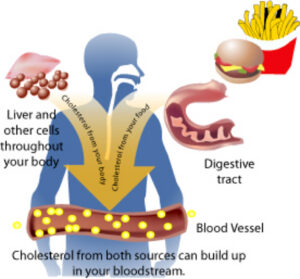Everyone’s heard about ‘cholesterol’ – we know it’s something we need to be conscious of if we want a healthy heart. If you’re over 40, your doctor has likely even tested your levels (even earlier if you have a family history). But do you know what it is, really?
Let’s get to the truth about cholesterol!
Our body is essentially a supremely intelligent bio-computer, which knows instinctively how to perform its millions of miraculous functions, day in, day out. Central to all of these functions, of course, is the heart. The heart works every second of our lives to pump blood throughout the entire network of blood vessels in our bodies. This oxygenated blood is the life force which underlies all other functions and is essential to our continued existence.
But when we don’t take care of this most-important organ, it is forced to work even harder and things can start to go wrong.
What is Cholesterol?
Cholesterol is a waxy-type of fat found in the body. It is mainly produced in the liver, but also in smaller amounts in the reproductive organs and the adrenal glands. It is transported through the body in the blood (in the form of a ‘lipoprotein’) to sites where it is needed.
Despite its lousy reputation, cholesterol is not all bad. It does have an important function to play inside your body. In the right amounts, cholesterol helps maintain the integrity of cellular membranes. Because it is (for the most part) insoluble in water, it can control what substances go in and out of the body’s cells. This is an important protective mechanism in the body.
Cholesterol is also an integral part of many hormones – estrogen and testosterone for starters. These sex hormones are important during puberty and beyond for proper development, reproduction and vitality.
So don’t dismiss this naturally occurring substance too soon!
Where things can start to go wrong…
Now, you’ve probably heard about good cholesterol and bad cholesterol. You probably even know which foods contain each one. But do you know the actual difference that is caused in your body by the two substances?
As we’ve discussed, the liver produces most of the cholesterol. Even if you ate a diet containing zero cholesterol, your liver would still be able to produce this important substance. But we can also produce it from the foods we eat. If more cholesterol is needed, or if we are ingesting too much of it in our diet, our body starts to process it from the foods we eat, specifically from the fats.
Our diets may contain healthy fats or not-so-healthy ones. The good ones come from whole foods like nuts, salmon and olive oil. These types of foods contain the good type of cholesterol, which is useful and helpful in the body. The unhealthy ones come from things like processed baked goods, candy bars and fatty meats. Eating these foods once in a while is okay, but eating them often and in large amounts can pack a powerful cholesterol punch. Too much is entering the body and being converted, which can start to affect the health of your heart and blood vessels.
The bad guys…
These ‘bad’ fats are known as LDLs (low density lipoproteins). An easy way to remember, think “L” for “Lousy”- that is what I tell my private clients! In your body, bad fats are metabolized just like the good ones. Because they are an oxidized form of fat and quite sticky in texture, they can attach to artery walls where they harden into plaque.
These plaques narrow the opening through which the blood can travel, resulting in less blood getting through. This reduced flow means the heart has to pump a whole lot harder to supply the body with enough oxygenated blood.
If the narrowed vessels happen to be coronary arteries, then the heart itself is not receiving enough blood to do its job properly. Compromised blood flow of this nature can lead to a heart attack.
The good news is that ‘good’ fats contribute to HDL (high-density lipoproteins) levels, or good cholesterol. These good guys travel around the bloodstream picking up stray bad cholesterol molecules and ridding them from the body. Higher HDL levels therefore work to prevent the build-up of cholesterol plaques.
Now that you know about how cholesterol works in the body, you know the importance of choosing foods that will help your heart do its job and reduce your risk of stroke or heart attack. We only require 20 per cent of our cholesterol from food, so make sure you are reading labels and checking ingredients on the food you buy and eat to make sure you are getting the right types. Excellent foods to look out for that are high in healthy fats and cholesterol include healthy oils (olive, flaxseed, avocado, nut oils), cold-water fish (such as salmon) and nuts (think walnuts, almonds, pistachios and cashews).

Image from Optichol
Next week, I’m going to give you the ins and outs of triglycerides, another misunderstood part of the heart health puzzle.
For now though, head down to the comments and tell me: has your doctor tested your cholesterol?
